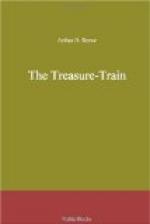“I can’t tell you how worried I am,” he murmured, almost to himself. “What can this thing be?”
He turned to us, and, although he had just been introduced, I am sure that our presence seemed to surprise him, for he went on talking to himself, “Oh yes—let me see—oh yes, friends of Doctor—er—Leslie.”
I had been studying him and trying to recall what I had just read of beriberi and polyneuritis. There flashed over my mind the recollection of what had been called Korsakoff’s syndrome, in which one of the mental disturbances was the memory of recent events. Did not this, I asked myself, indicate plainly enough that Leslie might be right in his suspicions of beriberi? It was all the more apparent a moment later when, turning to Miss Langdale, Wardlaw seemed almost instantly to forget our presence again. At any rate, his anxiety was easy to see.
After a few minutes’ chat during which Craig observed Wardlaw’s symptoms, too, we excused ourselves, and the Health Commissioner undertook to conduct us to his office to show us what he had done so far. As for me, I could not get Miss Langdale out of my mind, and especially the mysterious letter to Kennedy. What of it and what of its secret sender?
None of us said much until, half an hour later, in the department laboratory, Leslie began to recapitulate what he had already done in the case.
“You asked whether I had examined the food,” he remarked, pausing in a corner before several cages in which were a number of pigeons, separated and carefully tagged. With a wave of his hand at one group of cages he continued: “These fellows I have been feeding exclusively on samples of the various foods which I took from the Wardlaw family when I first went up there. Here, too, are charts showing what I have observed up to date. Over there are the ’controls’—pigeons from the same group which have been fed regularly on the usual diet so that I can check my tests.”
Kennedy fell to examining the pigeons carefully as well as the charts and records of feeding and results. None of the birds fed on what had been taken from the apartment looked well, though some were worse than others.
“I want you to observe this fellow,” pointed out Leslie at last, singling out one cage. The pigeon in it was a pathetic figure. His eyes seemed dull and glazed. He paid little or no attention to us; even his food and water did not seem to interest him. Instead of strutting about, he seemed to be positively wabbly on his feet. Kennedy examined this one longer and more carefully than any of the rest.
“There are certainly all the symptoms of beriberi, or rather, polyneuritis, in pigeons, with that bird,” admitted Craig, finally, looking up at Leslie.
The commissioner seemed to be gratified. “You know,” he remarked, “beriberi itself is a common disease in the Orient. There has been a good deal of study of it and the cause is now known to be the lack of something in the food, which in the Orient is mostly rice. Polishing the rice, which removes part of the outer coat, also takes away something that is necessary for life, which scientists now call ‘vitamines.’”




